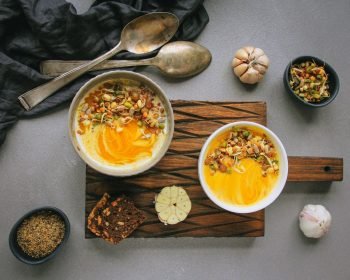Shows | Somebody Feed Phil: Food Adventures with a Touch of Culture
Discover > Product Recs > Shows | Somebody Feed Phil: Food Adventures with a Touch of Culture
What better way to celebrate the holidays than to indulge in some cultured television and learn about ancient cooking practices from all over the world. In Somebody Feed Phil, the creator of Everybody Loves Raymond travels the world. Phil Rosenthal has displayed his rich devotion to the Jewish culture in many of his productions. He even traveled to Tel Aviv to shoot the Israel version of Everybody Loves Raymond. New York is his hometown and also has an extremely large Jewish population. His friends from New York are what have inspired the characters he's created.
Somebody Feed Phil
He visits Montreal, Dublin, Copenhagen, London, New York, and Israel - to learn about food culture. Phil makes the audience feel like friends and shares his sense of humor, his parents, his love for food - and a little about his heritage.
Phil Rosenthal
Phil shares how food has influenced his life. Yet he portrays his mother's cooking through tongue-in-cheek humor of being god awful. In the Tel Aviv episode, he states that the man showing him around only shows the places he chooses, without considering where Phil would like to visit. The national pride of the country made him feel "as though he were in Hebrew school all over again". Phil has a humorous approach to his heritage and food culture. On Funny or Die, you will even find several 3-4 minute skits that he does. Jewish Die Hard in a Semitic makeover to a controversial Christmas movie most of us have watched Bruce Willis in. It's important that we share ancient cultures and looking deeper into traditions. We can help educate ourselves and others, and help break stereotypical mindsets.
In honor of the upcoming Hanukkah holiday, let's look at its history and how it's celebrated today.
The History of Hanukkah
Jerusalem, 168 BC - King Antiochus IV Epiphanes outlawed the Jewish practice. He and his men did this by defiling the Jewish temple, installing an altar for Zeus Olympios, and sacrificing pigs. His attempts to suppress Judaism brought on the Wars of the Maccabees, the Jewish army. They had only enough oil to light the Temple's Menorah, an important ritual object, for one day. Miraculously, it was lit for eight days which is represented by the menorah used to celebrate the event today. The "Festival of Lights" or Hanukkah has since been Americanized for children and involves candy and presents, which makes every holiday inviting. Even more importantly, it has become one of the only times Jewish families engage in ancestral culture on a global scale.
Religious Food Practices
Many ancient religious food practices surround the idea of ethical eating. Food should be cherished and is used for devotion and respect to God. Food must be clean & pure in order for us to gain nutritional value from it. This is all shown in the series Somebody Feed Phil. Actually, the more I was able to identify what kosher eating is, the more I was able to notice how many dishes were following the guidelines.
Many Jewish, Islamic, and Seventh-day Adventists don't eat pork because only animals that "chew the cud" and have split hooves are considered clean. I had to research the inner meaning behind why split hooves and chewing the cud are so important. It all stems down to philosophical beliefs and showing our respect to religious beliefs. We can "become part of what we eat - flesh, blood and personality." While meat is considered the divine attribute of judgement, and dairy the divine attribute of kindness - you shouldn't mix the two in one siting. "Don't cook a kid in its mother's milk" ancient believers would say. And there's a whole equation for what to eat and when during the Jewish holiday.
Kosher Eating Worldwide
You can definitely see Phil's cultural roots being displayed in his food preferences. In London, he tries venison (What wine goes well with venison?) (kosher) and vegetarian shawarma (also kosher). In Israel, he indulges in Shakshuka - a rich breakfast stew topped with eggs. He further researches the Middle Eastern dish, Shawarma - which as about "as common as a club sandwich back home". He also experiences an Iraqi fried eggplant (how long does eggplant last?)sandwich topped with a hard-boiled egg and tahini (how long does tahini last?), Sabich.
What We Can Learn from Other Cultures
There is much to learn from ancient food cultures and cooking techniques used by certain communities. Ruminants are considered the cleanest animals for us to eat by many cultures. Birds of prey, crustaceans, and fish without scales are considered unclean. Our higher faculties (head & heart) serve our thoughts and emotions. While our lower faculties (arms & legs) serve us for earthly pursuits. The split hooves of kosher animals are meant to draw balance and serve a constant effort to stay on a straight path.
There's not a new season planned for Somebody Feed Phil since the pandemic. But I really hope Phil decides to travel to more Middle Eastern, Mediterranean and Indian cultures next! I think he would have some insightful opinions and share delicious recipes. It's important to research traditional food cultures this holiday season to see what you can transition into your kitchen. Find out more about Texas culture and how it relates to German ancestors here. You can also read about how Hanukkah is celebrated around the world here!






